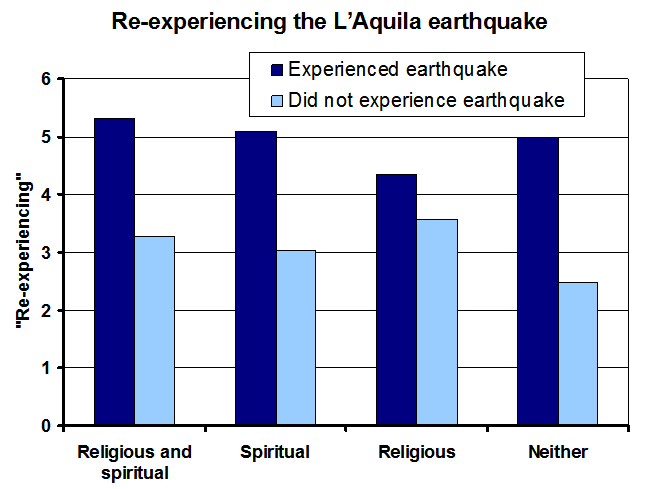On the 6th of April 2009, a 6.3-magnitude earthquake struck the town of L’Aquila, in central Italy. The result was at least 309 deaths, with more than 1,000 people injured and 66,000 displaced. (After the earthquake, 6 scientists were put on trial for failing to predict it).
Some time after the earthquake, Paolo Stratta and colleagues from the Department of Mental Health in L’Aquila, along with colleagues from the University of Pisa and the University of L’Aquila, interviewed 410 people who had experienced the quake and another 491 from nearby districts that were not directly affected by the
event
Overall, those who had experienced the event reported that they had fewer spiritual experiences and beliefs. You can compare that with two other recent studies. Religious beliefs of Norwegian tsunami survivors did not changes in any systematic way (although they were more likely to change), while people bereaved in 9-11 terrorist attacks tended to become less religious. Overall, I would say that people change their beliefs in response to a traumatic event, and in religious countries (USA, Italy), that probably means becoming less religious.
This study also found that people who had directly experienced the earthquake also reported suffering more post-traumatic stress. That’s not surprising, but they found something interesting when they divided the respondents according to whether they they said they were religious, spiritual, both or neither.
In general, the difference in stress levels between those who were exposed to the event and those who were not was smaller for religious people than for spiritual people or those who were neither.
This only reached statistical significance on two of the many subscales they looked at – assessing whether people had anxious flashbacks (shown in the graphic), and whether they were affected emotionally (things like dulled emotions, feeling cut off, or changed personality). But overall the effect seems to be robust.
The “Re-experiencing” subscale of the questionnaire they used asked whether, since the event, their subjects had ever:
- …had recurrent bad dreams or nightmares about the loss or event, or awakened terrified?
- …suddenly gotten bad feelings when you were around certain places, odors, sounds or people?
- …felt or acted as if the events were happening again?
- …had distressing thoughts, feelings, or images related to the loss or event?
- …become more distressed at the time of year when the loss or event occurred?
- Did you notice that other people avoided talking about the loss or event because you got so upset?
While the “Arousal” scale asked whether they had:
- …have trouble concentrating or paying attention, for example, following the story line of a TV program or book or remembering what you had read?
- …feel like you just couldn’t relax or let your guard down?
- …startle easily at the sound of sudden noises, or when someone touched you, spoke to you, or approached you unexpectedly?
- …feel more irritable, have outbursts of anger or rage, or lose your temper over minor things?
- …have more difficulty falling asleep or staying asleep than before or need a light on to go to sleep?
But if you look at the graph, you can see that something more complex is happening. The reason that there is no difference among religious people is not just because between those who experienced the event have fewer ill effects. It’s also because those who did not directly experience it have more flashbacks.
It seems that religious people who did not directly experience the event were still affected by it, while those who did experience it were less affected. Perhaps this is because they are plugged into a wider social network, which allows the burden of distressing events to be shared.
![]()
Stratta, P., Capanna, C., Riccardi, I., Perugi, G., Toni, C., Dell’Osso, L., & Rossi, A. (2012). Spirituality and Religiosity in the Aftermath of a Natural Catastrophe in Italy Journal of Religion and Health DOI: 10.1007/s10943-012-9591-z
Dell’Osso, L., Shear, M., Carmassi, C., Rucci, P., Maser, J., Frank, E., Endicott, J., Lorettu, L., Altamura, C., Carpiniello, B., Perris, F., Conversano, C., Ciapparelli, A., Carlini, M., Sarno, N., & Cassano, G. (2008). Validity and reliability of the Structured Clinical Interview for the Trauma and Loss Spectrum (SCI-TALS) Clinical Practice and Epidemiology in Mental Health, 4 (1) DOI: 10.1186/1745-0179-4-2
 This article by Tom Rees was first published on Epiphenom. It is licensed under Creative Commons.
This article by Tom Rees was first published on Epiphenom. It is licensed under Creative Commons.














